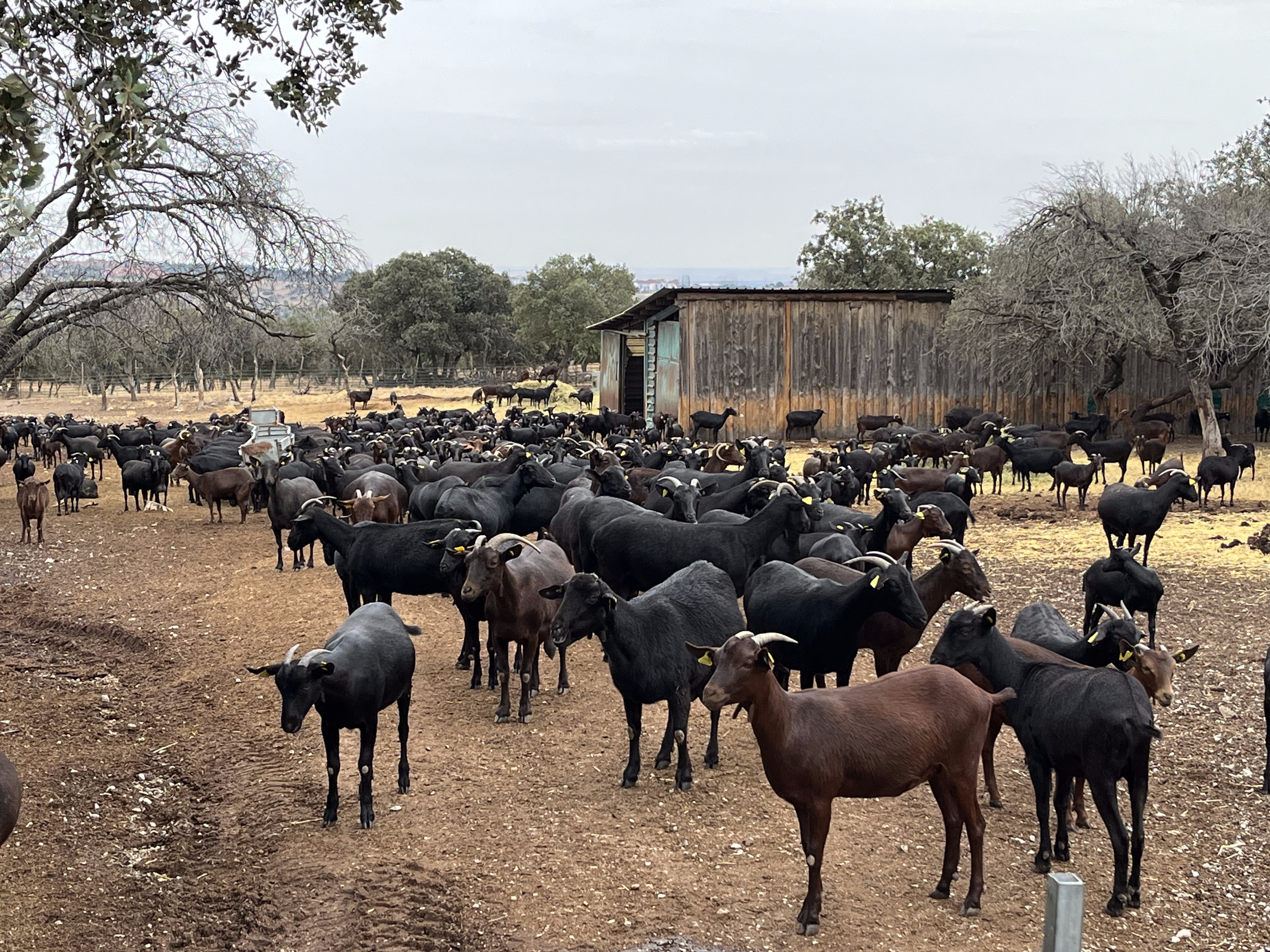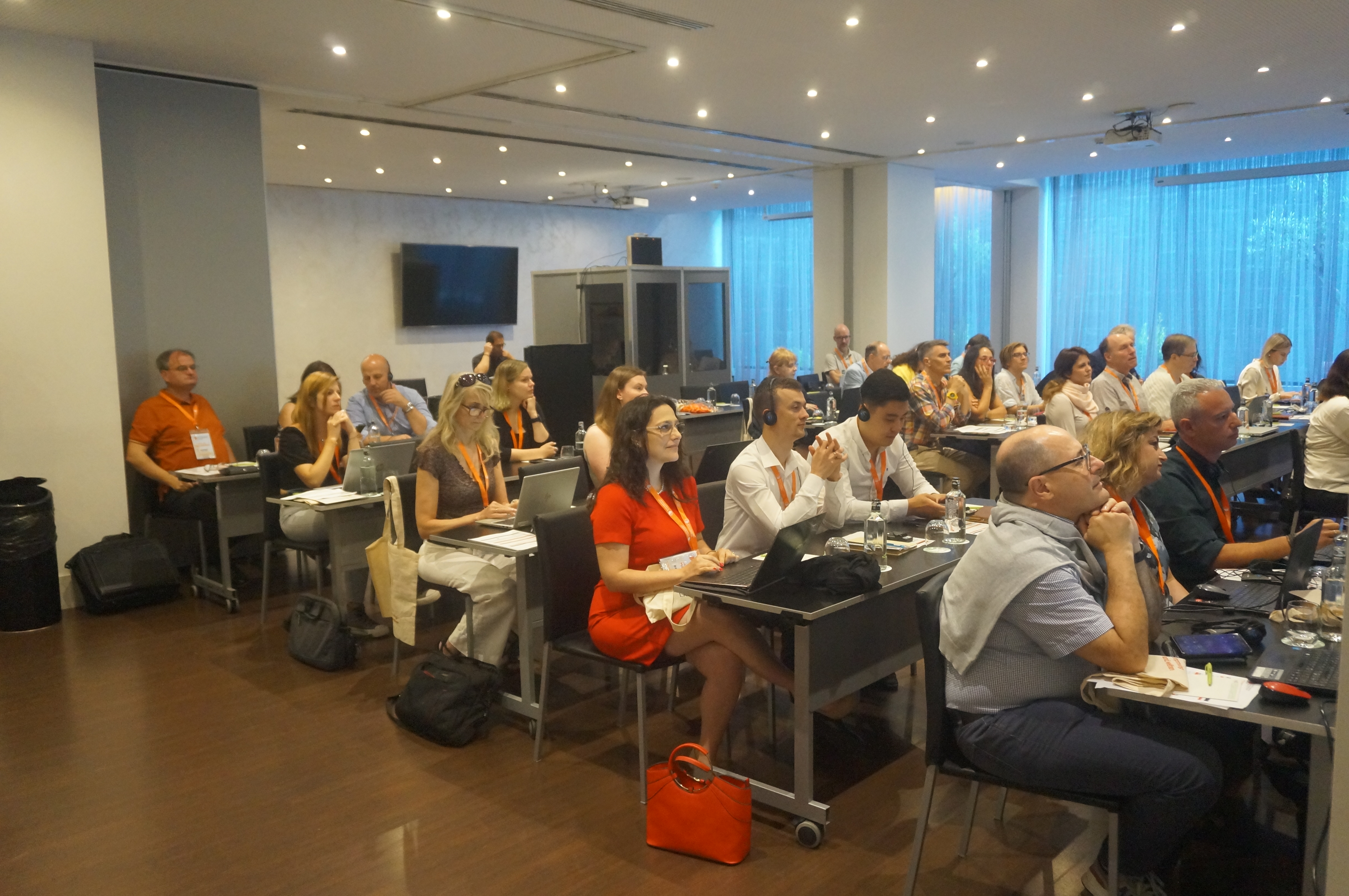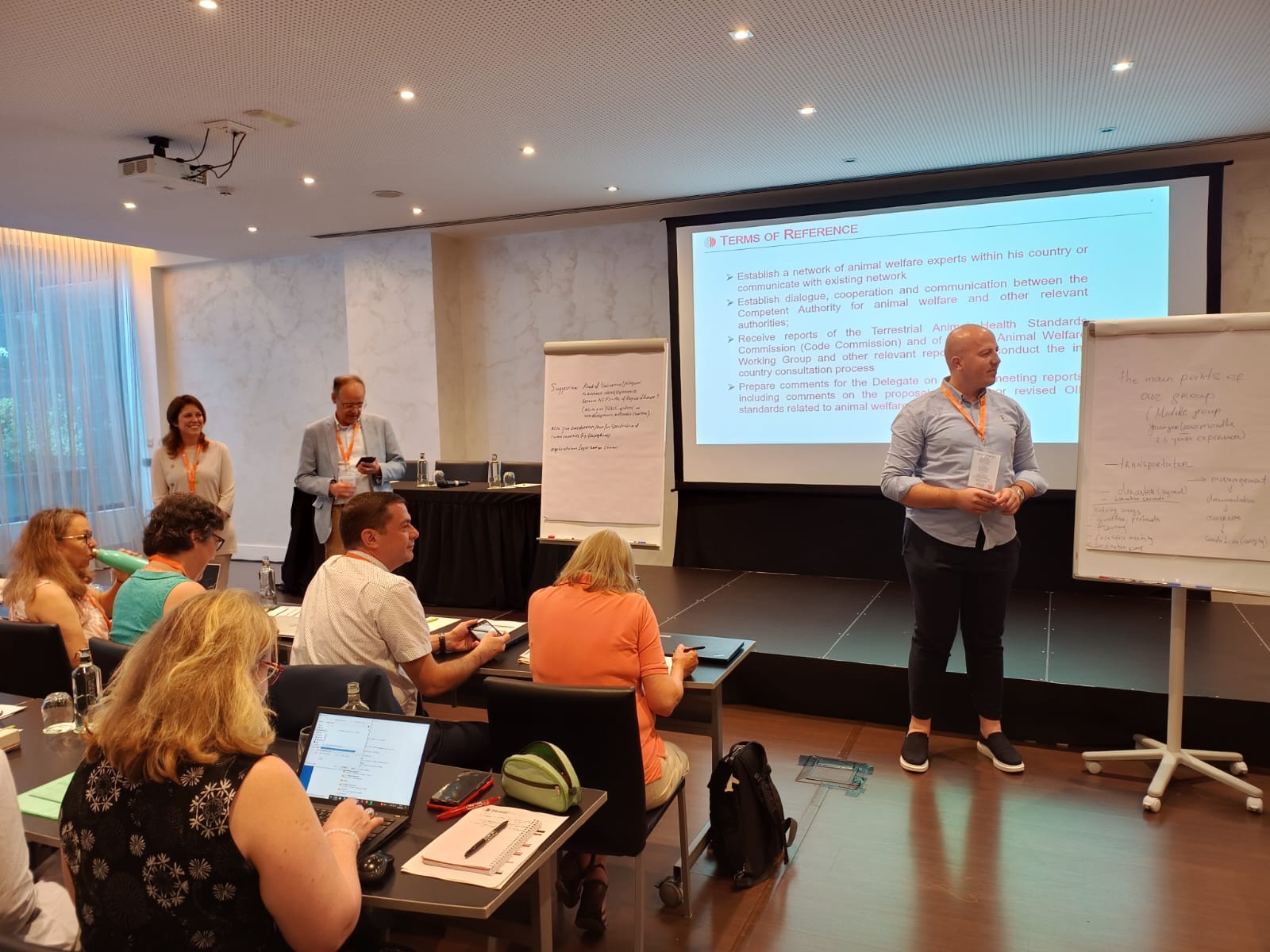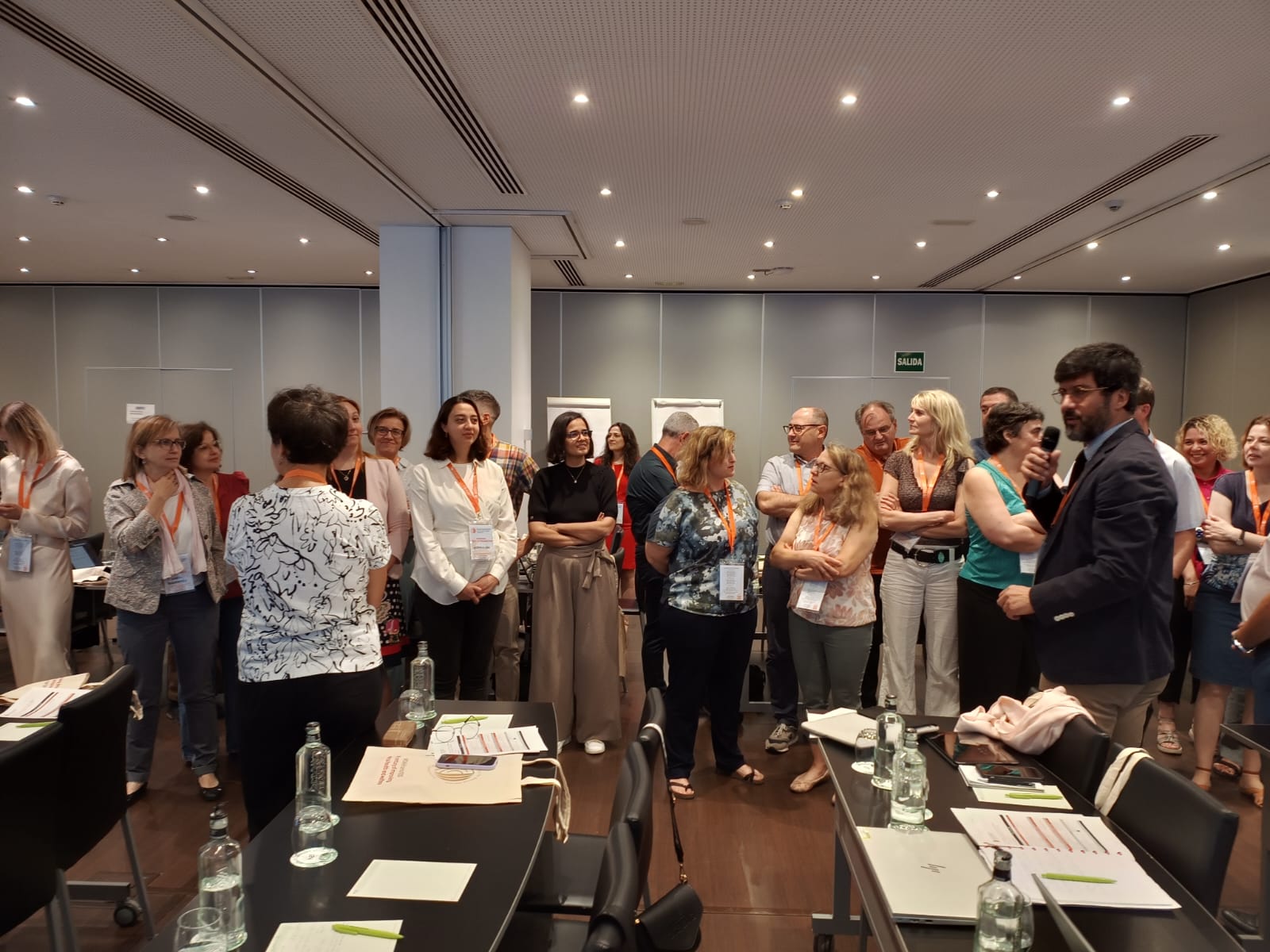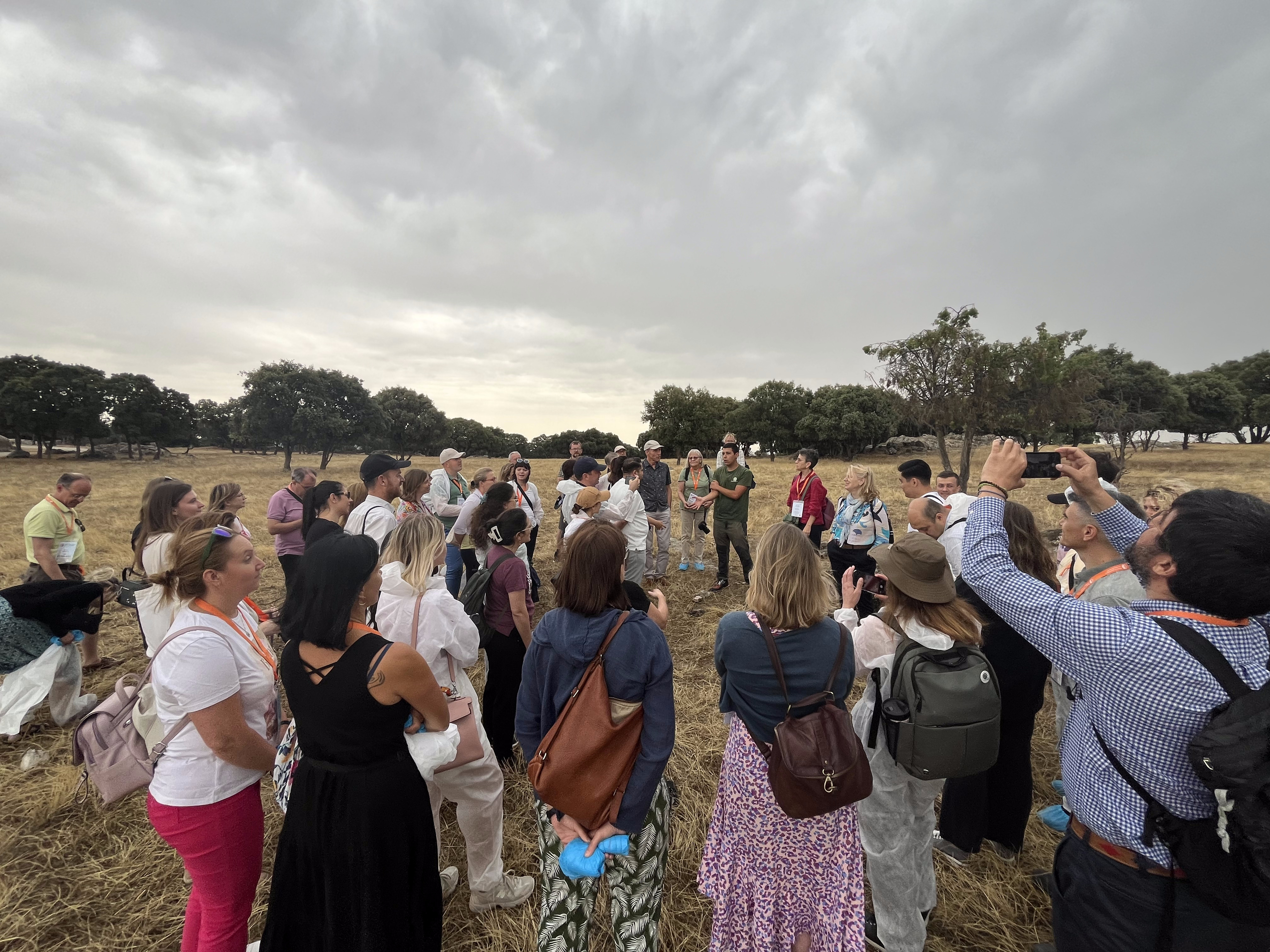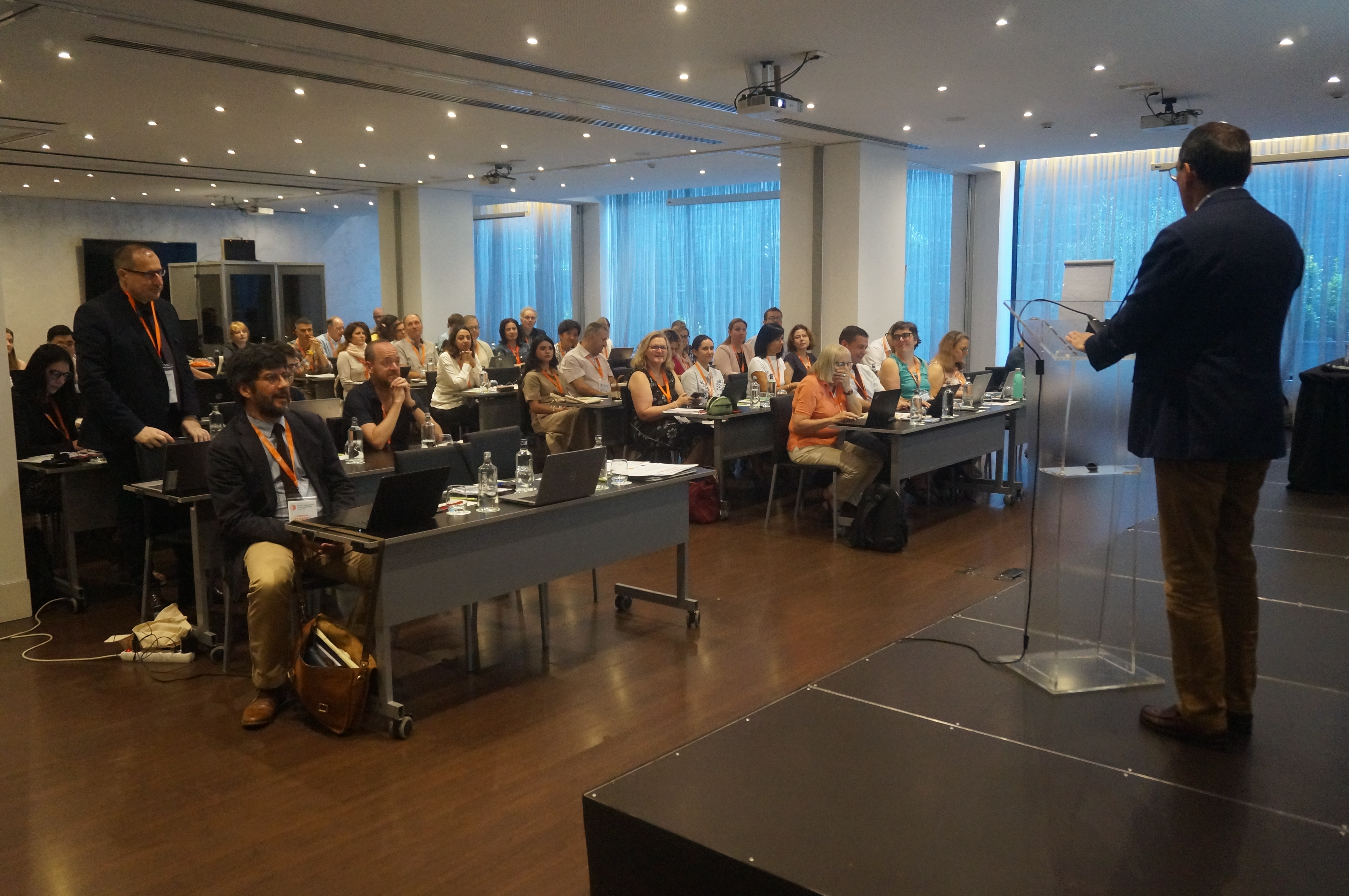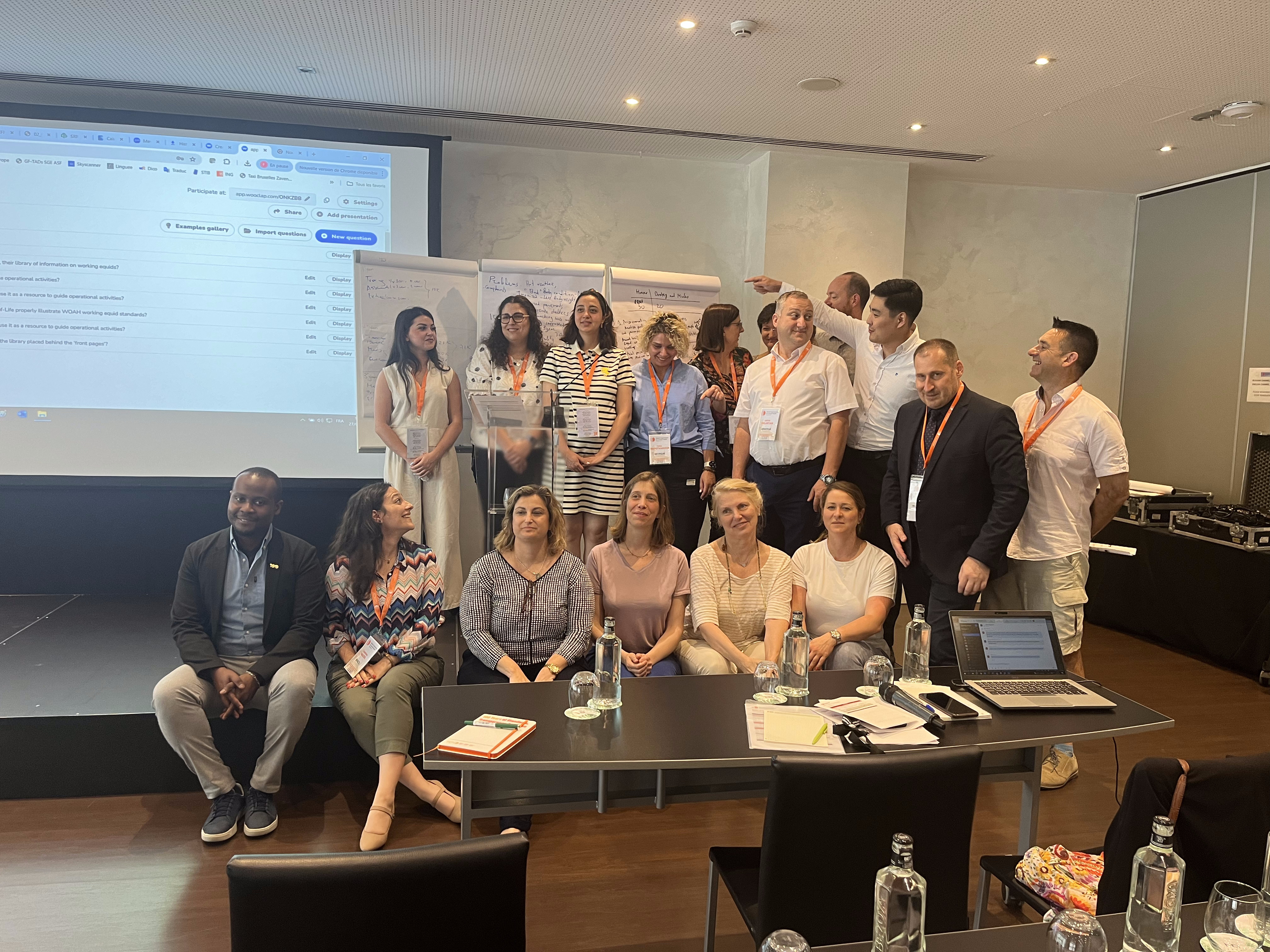Between June 25th to 27th 2024, 42 out of the 53 National Focal Points for Animal Welfare (NFPAW) from the European region convened in Madrid, Spain, for an in-person training seminar. The seminar, organised by the World Organisation for Animal Health (WOAH), provided an opportunity for NFPAW to come together and engage in fruitful discussions surrounding the latest updates on the implementation of the WOAH Global Animal Welfare Strategy and regional activities of the Platform on Animal Welfare for Europe.
The event was a milestone in setting up the transversal discussion approach for Welfare of Animals in the context of developing and implementing WOAH standards, with a focus on advancing animal welfare through collaboration, knowledge sharing, and practical training. The seminar also covered a wide range of topics, including the economics of animal welfare, differing national laws, scientific advances, or the implementation of animal welfare standards. It also allowed NFPAWs to connect with their peers across Europe, exchanging knowledge, and discussing common challenges and potential solutions.
# Legislative approach within the Animal Welfare for Europe
The variety of topics covered during the sessions highlighted the transversality of the Animal Welfare nature, starting with an in-depth exploration of global animal welfare legislation. Participants examined different countries’ approaches to animal welfare laws, minding the specific legal structures and hierarchies within each nation. One of the key takeaways was the importance of consistent terminology and clear legal distinctions to ensure uniformity in the implementation of animal welfare laws.
On a similar legislative note, the European Commission (EC) provided an update on the revision of EU animal welfare legislation under the “EU Farm to Fork Strategy.” The revision process has resulted in two significant proposals: one addressing the protection of animals during transport, and another focusing on the welfare and traceability of dogs and cats. The EC also emphasised the need for regulatory dialogue with non-EU countries to foster collaboration and mutual understanding in animal welfare.
# The Economics of Animal Welfare and One Health Approach: Keys for Sustainable Animal Welfare?
Intertwined with the legislative topics, the seminar shared insights into the economic aspects of animal welfare. The presentation demonstrated link between improved animal welfare standards and long-term economic benefits, sharing that while public regulations set the baseline, private market-driven initiatives can set higher welfare standards. The latter facilitated discussions amongst participants on how animal welfare can be optimised within production systems to benefit both animal health and the economy, emphasizing the growing role of market demands in shaping these standards.
During the seminar, the concepts of *One Health* and *One Welfare* were discussed, which integrates animal welfare with human health and environmental sustainability. This comprehensive approach promotes interdisciplinary collaboration across sectors to tackle interconnected issues such as zoonotic diseases, environmental impacts, and public health. By viewing animal welfare within this broader framework, NFPAWs are better equipped to address complex challenges in a collaborative manner.
The workshop’s holistic approach and focus on economic benefits provided a smooth introduction to Public-Private Partnerships (PPPs). Presented as a vital tool for sustainable animal welfare, PPPs highlight the importance of shared responsibilities and resources between public and private sectors for more effective outcomes. The OIE PPP Handbook, offering guidance on fostering such collaborations, serves as a key resource for partners. The PPP session evolved into working group exercises, where participants explored the potential of PPPs to support the implementation of animal welfare standards. This collaborative approach enables stakeholders to pool expertise and resources to tackle complex animal welfare challenges.
# Scientific Advances in Animal Welfare
Scientific advancements in animal welfare assessment were also discussed during the workshop. A presentation focused on the latest developments in animal-based measures (ABMs) for assessing animal welfare, highlighting that while considerable attention has been given to animal health and environmental factors, a significant gap remains in assessing behavioural and mental welfare domains. It also emphasised the need for greater standardisation in welfare assessments and showcased how emerging technologies, such as Precision Livestock Farming (PLF), could support individual-focused welfare monitoring.
Building on the discussion of scientific advancements, an update on animal welfare indicators at the slaughterhouse was presented. Based on the scientific findings, animal welfare assessments should focus not only on stunning and bleeding, but over the entire process, from unloading of animals upon arrival at the slaughterhouse to the processing of the carcass. Furthermore, such a set of indicators should encompass both input (i.e. resource and management based) and out-put (animal-based) indicator, to align with the preventive intentions of the animal welfare legislation.
On a similar note, the aquatic welfare was not overlooked. The presentation on the welfare of farmed fish, and related scientific advancements, underscored the importance of water quality in maintaining fish health. Proper monitoring of water parameters such as oxygen levels, temperature, and pH is essential to ensure optimal conditions for farmed fish, reducing stress and promoting overall welfare. The seminar reinforced the need for increased awareness and action to support the implementation of WOAH standards for farmed fish welfare.
# Collaborative Knowledge-Sharing, Networking and Capacity Building for an improved Welfare
The WOAH Collaboration Centre on Animal Welfare and European Reference Centres for Animal Welfare play a key role in promoting knowledge-sharing across Europe. Collaboration, such as those between the Istituto Zooprofilattico Sperimentale in Teramo (Italy) and the Swedish Centre for Animal Welfare at SLU (Sweden) exemplify the positive impact in exchanging best practices, scientific insights, and practical tools to enhance animal welfare standards across the region.
Despite these advancements, it was also emphasised the need to close gaps in knowledge dissemination by increasing global collaboration, to improve animal welfare and reduce negative impacts on animals.
# Outcomes
Beyond all technical discussions, the seminar provided NFPAW with invaluable networking opportunities. As the key figures supporting their countries’ WOAH delegates, NFPAW play a crucial role in shaping national, regional and international animal welfare policies. By connecting with their peers, sharing experiences, and discussing common challenges, they were able to strengthen their capacity to influence and improve animal welfare at all levels.
The 2024 NFPAW seminar in Madrid was a significant step forward in advancing animal welfare in the European region. Focusing on a transversal range of topics like legal frameworks, economic impacts, scientific advancements, and collaborative innovation, it provided NFPAWs with the tools and connections to support the development and implementation of effective animal welfare standards. The latter reinforced that animal welfare is a multidisciplinary issue, requiring mutual efforts from policymakers, scientists, veterinarians, animal rights advocates, and private stakeholders. In a rapidly evolving world, the commitment of NFPAW to fostering stronger networks and knowledge-sharing is key to ensuring the continued improvement of animal welfare across Europe and beyond.
The last day of our seminar in Madrid had dedicated to the five priority topics of the Platform on Animal Welfare for Europe. For this section, we have invited Dr Hen Honig Felman, our National Focal Point on Animal Welfare for Israel, to share her perspective on the activities of the platform.
“In the WOAH Europe region, the Platform on Animal Welfare for Europe, launched in 2013, continuously supports Members in improving animal welfare through the implementation of its 4th Action Plan (2024-2026), focusing on five main areas: dog population management, animal slaughter, animal transport, disasters, and working equid welfare. Adopted during the WOAH General Session in Paris, the plan addresses critical issues raised during its development.
Animal transport, both by land and sea, remains a global concern due to inconsistent legal frameworks across borders. Sea transport, in particular, lacks specific legislation, highlighting the need for standardised welfare assessments and tools to address issues consistently. Another crucial aspect is the need for uniformity in animal transport assessments to better understand and address the concern. Consequently, the development of clear and consistent tools for assessing welfare during transport supported by the Animal Welfare Platform is essential.
To disseminate the latest knowledge accumulated over the years on the subject of animal slaughter, and recognizing the ongoing employee turnover in the field, an e-learning module will be developed. This will ensure that all personnel in the field have access to these essential resources.
On Dog population management, the initiative is advancing in the countries designated to spearhead the process. At the same time, existing tools, such as the welfare assessment software, are now accessible to various nations. This topic is closely related to the WOAH’s next focus: animal welfare during natural disasters. During such events, there is a significant increase in the movement of animals, especially dogs, whether with owners or not.
Animal welfare during disasters is another escalating focus, as emergencies—natural or human-made—impact pets, farm animals, and wildlife. To address this, the Platform plans a regional multi-hazard workshop on contingency planning for animal welfare during disasters.
Lastly, on the welfare of working equids the meeting organised during the seminar for NFPAW fostered the idea to develop a workshop adapted to the target Focal Points’ needs.
In summary, from the focal point perspective, the Platform establishes a practical framework for sharing and communicating knowledge and experiences on the key welfare issues.
More information
All documents relating to the seminar in Madrid can be found in our WOAH website of the region, at Regional training seminar for National Focal Points on Animal Welfare – 2024 – WOAH – Europe.
Follow the link for more information about the European Commission’s “Farm to Fork Strategy”.
PDF - 546.08KB
